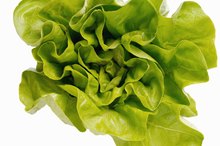What does fact checked mean?
At Healthfully, we strive to deliver objective content that is accurate and up-to-date. Our team periodically reviews articles in order to ensure content quality. The sources cited below consist of evidence from peer-reviewed journals, prominent medical organizations, academic associations, and government data.
- National Digestive Diseases Information Clearinghouse: Gas in the Digestive Tract
- MedlinePlus: Fiber
The information contained on this site is for informational purposes only, and should not be used as a substitute for the advice of a professional health care provider. Please check with the appropriate physician regarding health questions and concerns. Although we strive to deliver accurate and up-to-date information, no guarantee to that effect is made.
Do Blackberries Cause Bloating?
Blackberries are high in fiber and antioxidants that promote health. Not everyone who eats blackberries develops bloating, but if you notice that after eating blackberries you feel bloated, your digestive system might be sensitive to gas-forming foods. Consider a food allergy if you experience extreme bloating accompanied by other symptoms.
If you are experiencing serious medical symptoms, seek emergency treatment immediately.
Causes of Gas
During digestion, the foods you consume break down into simpler forms so that the body can absorb the nutrients and store fat and proteins for energy. Part of the digestive process is the development of vapors and gases. Most of the gases are expelled through belching or passing gas. Whatever gas remains in the gastrointestinal system builds up and causes bloating. Bloating causes you to feel full, your waist line to grow temporarily and a feeling of tightness to develop in your lower abdomen. Generally, bloating is a normal part of digestion.
- During digestion, the foods you consume break down into simpler forms so that the body can absorb the nutrients and store fat and proteins for energy.
Fiber in Blackberries
Why Does Bulgur Wheat Cause Bloating?
Learn More
Blackberries are high in fiber, containing 4 grams in a half cup, according to GoodHousekeeping.com 1. Fiber is the portion of the blackberry that is indigestible by the human body. Fiber helps to add more bulk to your stools, soften the stools and promote digestive regularity. The downside to eating more fiber in your diet is that it can cause short-term side effects, such as bloating, gas and abdominal pain. Most symptoms subside after eating a high-fiber diet for three days. If your symptoms remain or get worse, call your doctor for an evaluation.
- Blackberries are high in fiber, containing 4 grams in a half cup, according to GoodHousekeeping.com 1.
- The downside to eating more fiber in your diet is that it can cause short-term side effects, such as bloating, gas and abdominal pain.
Food Allergy or Intolerance
In some cases, extreme and chronic bloating from eating blackberries is a sign of a food allergy or intolerance 4. Food allergies cause minor to severe symptoms throughout the body because of a hypersensitivity of the immune system. Intolerances differ because they occur when the digestive system lacks certain enzymes needed to effectively digest certain aspects of blackberries. Food intolerances do not affect the immune system and primarily cause digestive complications.
- In some cases, extreme and chronic bloating from eating blackberries is a sign of a food allergy or intolerance 4.
- Food allergies cause minor to severe symptoms throughout the body because of a hypersensitivity of the immune system.
Other Possible Causes
Lower Stomach Pain and Walnuts
Learn More
Other factors also cause bloating. Avoid eating blackberries when you’re under stress or have anxiety. You might have a digestive infection, blockage in the intestines or a chronic disease. If you notice that you develop chronic diarrhea or constipation from eating blackberries, you might have a condition called irritable bowel syndrome.
- Other factors also cause bloating.
- If you notice that you develop chronic diarrhea or constipation from eating blackberries, you might have a condition called irritable bowel syndrome.
Related Articles
References
- GoodHousekeeping.com: Berry, Berry Nutritious
- University of Maryland Medical Center: Gas -- Flatulence
- MedlinePlus: Fiber
- The Early Show: Food Allergy vs. Food Intolerance
- Bowen-Forbes C, Zhang Y, Nair M. Anthocyanin content, antioxidant, anti-inflammatory and anticancer properties of blackberry and raspberry fruits. J Food Comp Analysis. 2010;23:554-60. doi:10.1016/j.jfca.2009.08.012.
- Blackberry, raw. FoodData Central. U.S. Department of Agriculture. Published April 1, 2020.
- González OA, Escamilla C, Danaher RJ, et al. Antibacterial effects of blackberry extract target periodontopathogens. J Periodont Res. 2013;48(1):80-6. doi:10.1111/j.1600-0765.2012.01506.x
- Rodríguez-Olleros Rodríguez C, Díaz Curiel M. Vitamin K and bone health: A review on the effects of vitamin K deficiency and supplementation and the effect of non-vitamin K antagonist oral anticoagulants on different bone parameters. J Osteoporos. 2019;2019:2069176. doi:10.1155/2019/2069176
- Pepa GD, Brandi ML. Microelements for bone boost: the last but not the least. Clin Cases Miner Bone Metab. 2016;13(3):181-185. doi:10.11138/ccmbm/2016.13.3.181
- Yamakawa MY, Uchino K, Watanabe Y, et al. Anthocyanin suppresses the toxicity of Aβ deposits through diversion of molecular forms in in vitro and in vivo models of Alzheimer's disease. Nutr Neurosci. 2016;19(1):32-42. doi:10.1179/1476830515y.0000000042
- American Academy of Allergy Asthma and Immunology. Possible anaphylaxis to blueberry: Potential cross-reactivity with other berries. Updated February 14, 2018.
- Tournas VH, Katsoudas E. Mould and yeast flora in fresh berries, grapes and citrus fruits. Int J Food Microbiol. 2005;105(1):11-7. doi:10.1016/j.ijfoodmicro.2005.05.002
Writer Bio
Diane Marks started her writing career in 2010 and has been in health care administration for more than 30 years. She holds a registered nurse license from Citizens General Hospital School of Nursing, a Bachelor of Arts in health care education from California University of Pennsylvania and a Master of Science in health administration from the University of Pittsburgh.









